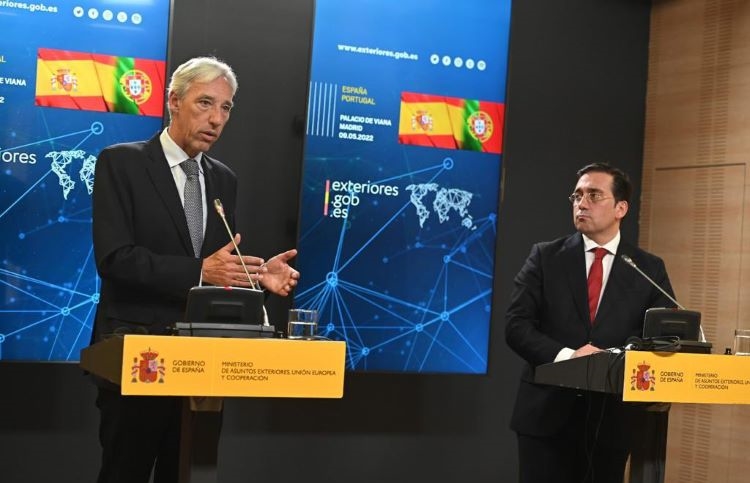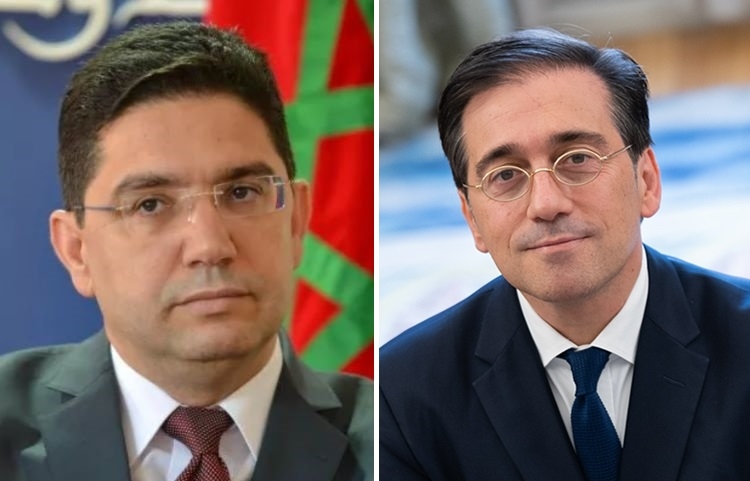Eduardo González
The governments of Spain and Portugal yesterday again offered the “Iberian energy hub” as an alternative to dependence on Russia, in the midst of the European debate on the embargo on Russian oil within the sixth package of sanctions, but warned that for this it is necessary to “complete the interconnections” pending between Spain and France.
“We have talked about how Europe can respond to the challenges posed by this war, precisely on this Europe Day, when it is more convenient than ever to defend Europe and European values,” said Foreign Minister José Manuel Albares during a joint press conference with his new Portuguese counterpart, João Gomes Cravinho, at the Palacio de Viana in Madrid.
“The Iberian energy hub can be an alternative to energy dependence on Russia,” because between the two countries “we have ten regasification plants, and that is more than half of Europe’s regasification capacity,” he continued. However, he warned, “for this to happen, we have to complete the interconnections, which are especially important for Spain and Portugal in all areas, be it transport or energy”. “At the moment, the gas interconnection is important to reduce this dependence on Russian gas and also to look to the future and for these pipes to be compatible with green hydrogen,” he added.
The Portuguese minister’s presence in Madrid came a day after EU ambassadors were unable to reach an agreement on the sixth package of sanctions on Vladimir Putin’s regime due to the reservations of countries such as Hungary, Slovakia or the Czech Republic, which are highly energy dependent on Russia. The European Commission’s proposal, which will continue to be negotiated throughout the week, foresees that the embargo on Russian oil will come into force at the end of the year and provides for an additional one-year period for the three countries mentioned above. The Czechs have demanded a three-year transitional period.
“We cannot allow Vladimir Putin to continue financing his illegal war with European funds, and obviously gas and oil are an important source of income for Russia,” but, at the same time, “we do not all have the same exposure to dependence on Russian gas and oil,” Albares admitted. “Therefore, the debate at the moment is not so much about whether to take the measure or not, but whether some transition periods are necessary for some European states; but, of course, Spain is always going to work in favor of unity regarding this package of sanctions, which we fully support, although we also understand the difficulties for some states that are particularly dependent,” he added.
“Europe must strengthen the Iberian counterweight to the energy market”
For his part, Gomes Cravinho – who yesterday made his first official trip as minister to an EU country in Madrid, in the same way that Albares did in Lisbon after his arrival in office – declared that it is “fundamental” for Europe to maintain unity in the face of Putin, but admitted that “maintaining unity means understanding that, in this framework of asymmetric impact of sanctions, we have to find solutions for everyone.” “Portugal would have no difficulty in turning off the tap today, already, but as Europeans we want to maintain and defend unity and we have to work with European partners who currently do not have that possibility,” he continued. “So far five sanctions packages have been approved and we all know that the sixth one is particularly difficult for some, but I am sure that all together we will find a solution and I have no doubt that the sixth package will be approved,” he added.
On the other hand, the Portuguese minister warned that “Portugal and Spain could be an energy alternative” to Russia, “but they are not yet”. “That is, Portugal and Spain are a significant part of the European response to the energy crisis and the energy transition, but this is going to take some time” and, for this, “we need to build infrastructures, mainly those pending between Spain and France,” he continued. “We are at a time when we have to take advantage of this strategic awareness that exists in Europe to significantly strengthen the counterweight that Spain and Portugal bring to the European energy market, which, in fact, has to be a European market and not a fragmented market,” he added.
“Two plus two” meeting between Foreign Affairs and Defense
Gomes Cravinho also informed that both ministers had agreed to hold, “hopefully before the summer”, the first “two plus two” meeting between the Ministers of Foreign Affairs and the Ministers of Defense of Spain and Portugal. This “new format”, approved last October during the bilateral summit in Trujillo, could not be carried out due to the early elections in Portugal, but the intention of the two countries “is to develop this model, which is planned to be an annual meeting, to allow the foreign and defense ministers of Portugal and Spain to reflect aloud and in a coordinated manner on the major strategic issues of our time”, explained the head of the Portuguese diplomacy.







